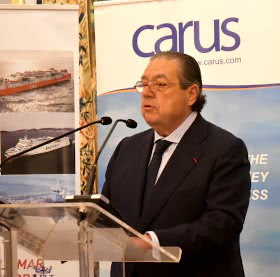
In the last decade the consistency of the flag fleet
Spanish fell by 13 percentage points. In addition
Since the beginning of this year seven ships, for a total of almost 100 thousand
tons of gross tonnage, lowered the Spanish flag for
hoist that of other nations of the European Union and none of the
newly built ships that joined in 2022
of the fleets controlled by Spanish shipowners has registered
to the Spanish International Naval Register REC. He highlighted it
yesterday, denouncing the loss of competitiveness of the flag
National, the president of the Spanish shipowning association
ANAVE, Vicente Boluda, in his closing report
of the shareholders' meeting held in Madrid.
 Noting that the consequence of this loss of competitiveness
is that the average age of the fleet registered in the REC is
Rising to 17, Boluda noted that "these figures
demonstrate that the important work that the Directorate-General of the
Marina Mercantile has carried out to update the regulations and the
procedures of the ECN were not sufficient to relaunch its
competitiveness. But - the president of ANAVE has specified -
I do not want to be misunderstood. In recent years, they have been introduced
Significant improvements that have helped unlock
problems that had stagnated for more than five years. Without
wanting to be exhaustive - recalled Boluda - only in the last
Year: the possibility of embarking private security teams
armed on ships flying the flag of Spain; the assimilation of
Ukrainian seafarers as citizens of the European Economic Area or
the adoption of regulations facilitating the recognition of
Certificates of competence of foreign seafarers are examples
concrete disposition of the General Directorate of the Navy
Mercantile, headed by Benito Núñez, to discuss the
our proposals. The speed and success in responding
to the concerns of the sector is worthy of praise and, therefore,
Thank you. However - continued Boluda - as ANAVE emphasizes from
several years, the ECN needs a comprehensive structural reform,
involving all the ministries on which operations depend
vessels flying the flag of Spain. Among other issues, it is
It is necessary to adapt the legal framework on labour, the law on
Prevention of risks at work designed for the
land and the bureaucracy and uncertainty associated with inspections of the
Maritime Labour Convention'.
Noting that the consequence of this loss of competitiveness
is that the average age of the fleet registered in the REC is
Rising to 17, Boluda noted that "these figures
demonstrate that the important work that the Directorate-General of the
Marina Mercantile has carried out to update the regulations and the
procedures of the ECN were not sufficient to relaunch its
competitiveness. But - the president of ANAVE has specified -
I do not want to be misunderstood. In recent years, they have been introduced
Significant improvements that have helped unlock
problems that had stagnated for more than five years. Without
wanting to be exhaustive - recalled Boluda - only in the last
Year: the possibility of embarking private security teams
armed on ships flying the flag of Spain; the assimilation of
Ukrainian seafarers as citizens of the European Economic Area or
the adoption of regulations facilitating the recognition of
Certificates of competence of foreign seafarers are examples
concrete disposition of the General Directorate of the Navy
Mercantile, headed by Benito Núñez, to discuss the
our proposals. The speed and success in responding
to the concerns of the sector is worthy of praise and, therefore,
Thank you. However - continued Boluda - as ANAVE emphasizes from
several years, the ECN needs a comprehensive structural reform,
involving all the ministries on which operations depend
vessels flying the flag of Spain. Among other issues, it is
It is necessary to adapt the legal framework on labour, the law on
Prevention of risks at work designed for the
land and the bureaucracy and uncertainty associated with inspections of the
Maritime Labour Convention'.
The president of ANAMA has urged direct intervention
of the Government: "The solution to these obstacles - has
affirmed - goes beyond the powers of the General Directorate of the Navy
Mercantile and the Ministry of Transport, and goodwill
of the Labour Inspectorate and the Social Institute of the Navy at the
in order to speed up medical examinations or the issuance of certificates.
At the base of the problem, probably - complained Boluda - there is
the lack of visibility of the maritime transport sector
on the national political agenda, at the highest level. That's why
we welcomed with great joy and satisfaction that the Management
General of the Merchant Marine decided to draw up a
'Maritime Strategy for Spain', which I hope will serve as
Pillar for the development of a maritime transport system
Spanish efficient, safe and environmentally friendly."